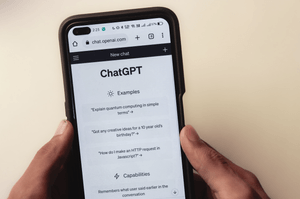Unlocking the Power of Unique Selling Proposition (USP) for Your Brand

What makes your brand stand out?
-
Understanding a unique selling proposition
- Unique selling propositions supercharge your branding and marketing efforts
- Where do USPs go?
- Unique selling propositions are different from Unique Value Propositions— and both are important
- A Unique Value Proposition (UVP) is a broader concept that encompasses the overall value that a business offers to its customers.
- Take a look at these unique selling proposition examples
-
The right unique selling proposition can give your company a real competitive advantage
Why Your Brand Needs a Unique Selling Proposition (USP) Now
Unique Selling Proposition (USP) is a marketing concept that describes the unique benefit or advantage that a product or service offers its customers.
You may also see "USP" refer to a "unique selling point" or "unique selling postion."
Each of these phrases conveys the same basic idea— a company's USP is what sets it apart from other brands in the market. It's what helps prospective customers differentiate between multiple brands in the same category. And it can give your company a distinct competitive advantage.
You're probably already familiar with some common USPs, like "save money," "better quality," "fast service," and more.
What makes your company's unique position so valuable?
In a market filled with overlapping products and services, it helps you clearly communicate your value proposition to your ideal customer.
A unique selling point— or a handful of selling points!— helps to build brand awareness, generate customer interest, and drive purchase decisions. And a strong USP can also enhance customer loyalty by delivering on the promise of a unique and valuable experience.
Before we go on, there are some common unique selling proposition misunderstandings worth clearing up
One big misconception is that in order to be effective, USP points must be completely unique. After all, unique is in the name! But that's not necessarily true.
Your unique selling proposition can simply be a combination of the existing features, benefits, or values that your company's products deliver.
You don't have to be the first company to offer a particular service, or the cheapest product in the market, to have a strong USP.
As long as your key defining feature, benefit, or value is presented in a distinctive and compelling way, you can have a strong, unique selling proposition!
Another misconception is that your USP is set in stone. But in reality, a unique selling proposition can (and should!) evolve over time, as your potential customers, company mission, and the competitive landscape change.
Understanding a unique selling proposition
Now, let's look at what makes a unique selling proposition one of the most important tools a successful business can use to stand out to its target market.
Unique selling propositions supercharge your branding and marketing efforts
A unique selling proposition is often used as a key message in a business' marketing communications because it helps to differentiate their brand from others in the market.
Whether you're an e-commerce business, a services company, or a startup somewhere in the middle, a clear unique selling proposition helps guide your customers' buying decisions.
When your prospective customers understand what particular benefit makes your online store, products, or service different from the next online retailer, they can make a well-informed purchasing decision. And if your high quality products or services happen to be priced higher than similar offerings from other businesses in the market, an effective unique selling proposition can prove why you're worth the extra cost.
Where do USPs go?
You'll often find businesses include their unique selling proposition on a landing page, on their social media profiles, and in their advertising collateral. Anywhere the business shows up, you're likely to find what makes them unique!
These are just a few examples of how weaving your unique selling proposition into your marketing messages is one aspect of a well-rounded brand strategy that pays off. But we'll share specific examples and a quick how-to g
Unique selling propositions are different from Unique Value Propositions— and both are important
Before we look at unique selling proposition examples and how to create a USP for your marketing campaigns, it's crucial to know what makes your USP different from your company's UVP.
A Unique Value Proposition (UVP) is a broader concept that encompasses the overall value that a business offers to its customers.
It includes all the benefits, features, branding, and experiences that a company provides, and how those elements all work together to solve a customer's problem, meet their needs, and make the world better.
Your unique selling proposition focuses on a specific benefit or unique quality that sets your particular product apart from other businesses. But your UVP is a more comprehensive and bold statement that considers everything your company provides to customers.
Take a look at these unique selling proposition examples
These unique selling proposition examples show just how powerful a key differentiator can be when incorporated into your marketing strategy.
TOMS Shoes: "Shoes for moving forward."
Death Wish Coffee: "The World's Strongest Coffee"
Stripe: "Payments infrastructure for the internet"
Taylor Stitch: "We design new products. You crowd fund them and save 20%. Our planet takes on less waste. We deliver them when they’re seasonally appropriate. Everybody wins."
In these unique selling proposition examples, each USP reflects the benefits that the companies' ideal customers value.
Strong coffee, easy payments, shoes that give back— these are great examples of how each unique selling proposition should highlight what makes your products different from your competitors' products, and speak directly to the desires of your ideal customer.
How to develop a strong unique selling proposition
Ready to get to work creating your own unique selling proposition? Start with these simple steps:
- Identify your ideal market. In order to get your USP in front of the right new customers, you have to know who you're targeting! It's crucial to start by researching your market and understanding your target audience to ensure you craft a message that makes your ideal customers buy!
- Conduct detailed competitive analysis. Understand the USPs of other small businesses in your industry. See what your competitors offer, what pain points they target, and how you can differentiate your own business.
- Identify what makes your business special. Pinpoint the benefits your company offers— the ones your customers value most, that your competitors just can't beat.
- Test and refine your unique selling proposition. Ask another business owner in your field to take a look at your USP. Get feedback from current customers. See what resonates in everyday life.
- Encorporate your USP into your marketing. Your new unique selling proposition should be splashed across your landing pages, used by your sales team, and woven into every piece of your content marketing.
ZeBrand's Brand DNA Framework makes developing your own killer USP easy!
Did you know ZeBrand offers a helpful Brand DNA builder that walks you through the steps of creating a strong unique selling proposition?
As you create your Brand DNA, our user-friendly tool will guide you through envisioning every element of your brand.
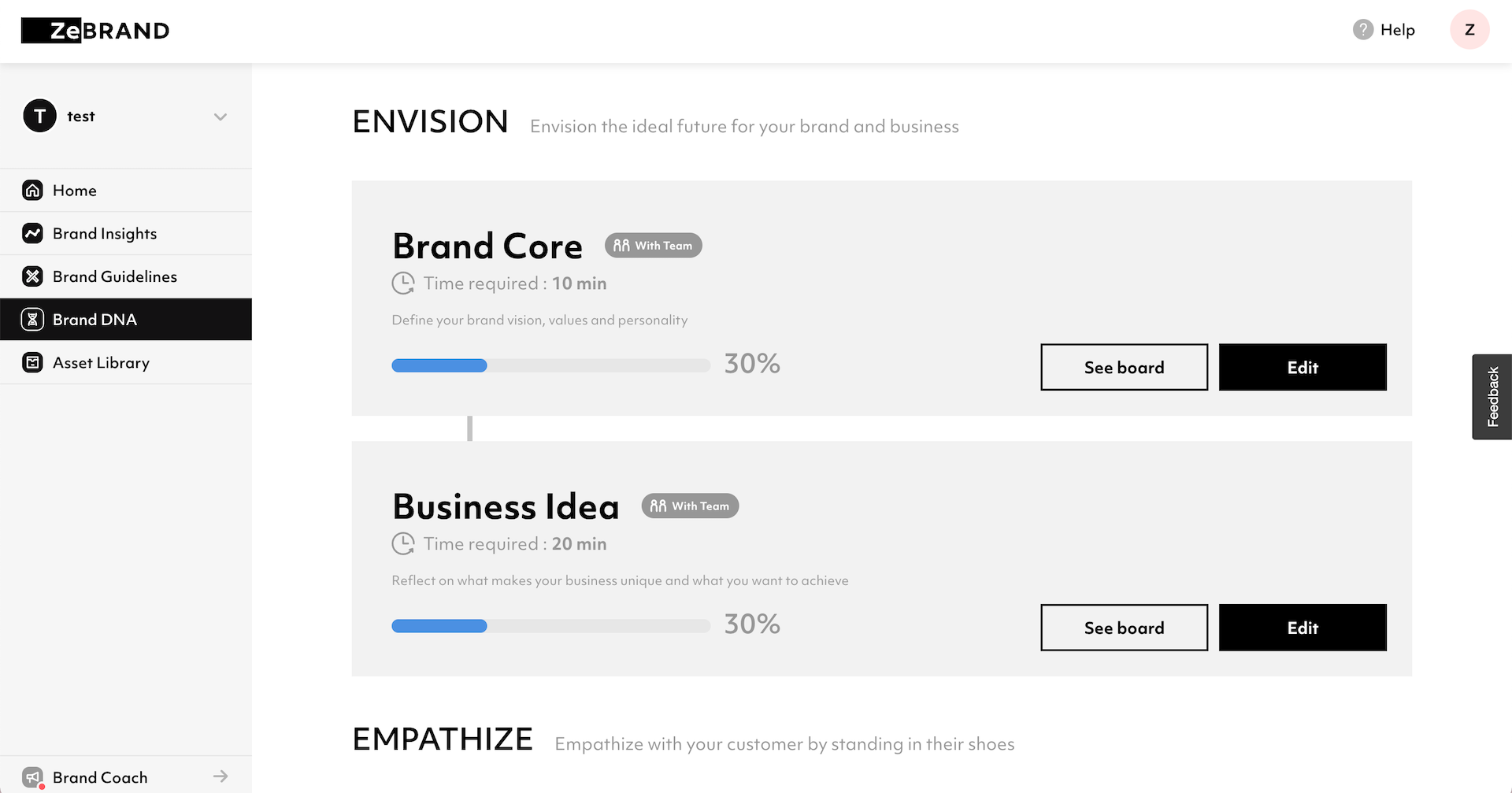
Our Business Idea Board is your space to dig into what makes your brand special— and how to communicate that position to your customers.
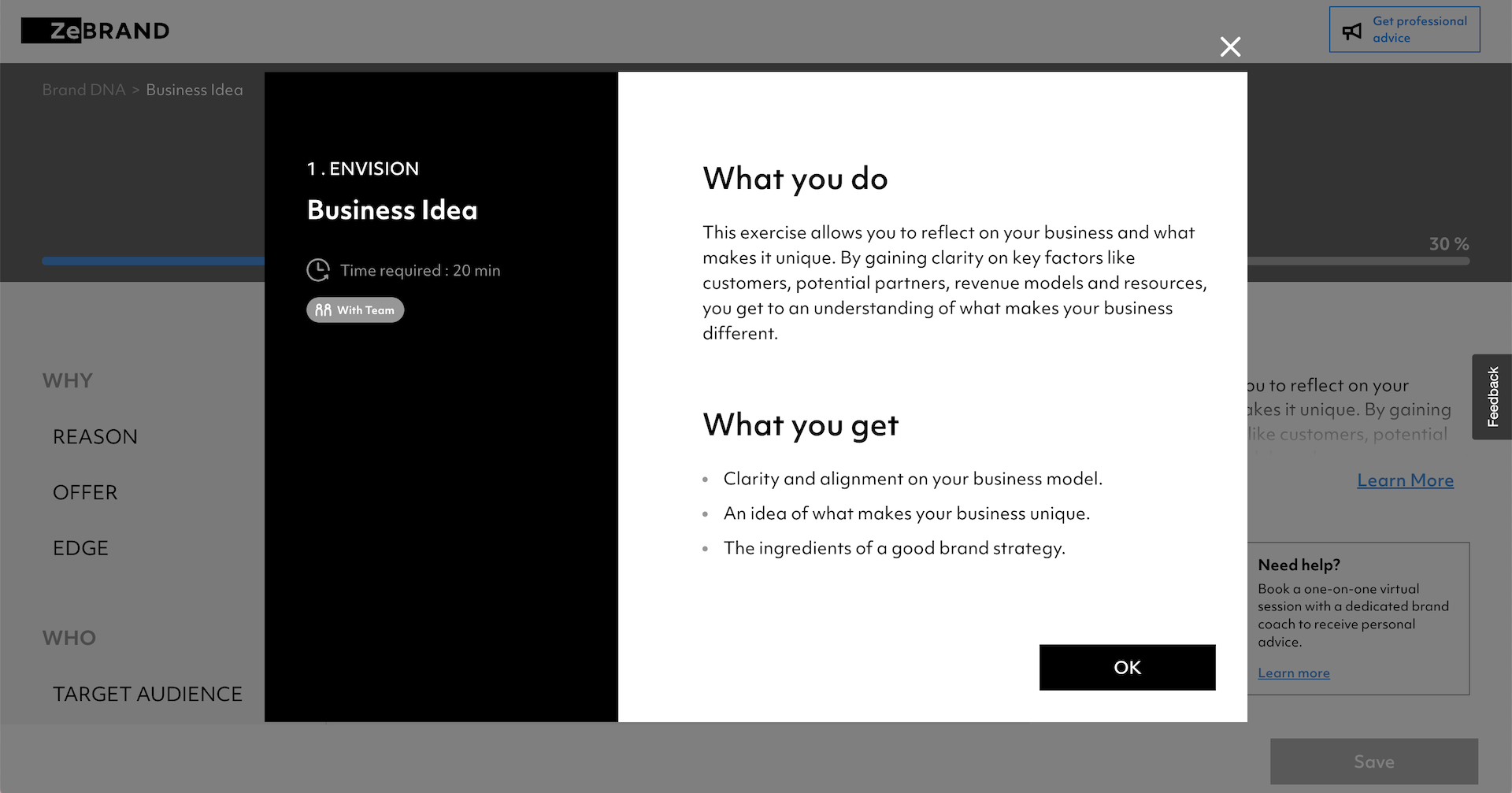
Work through the guided steps to define what makes your small business stand out. You'll take time to define your business model, brand strategy, target audience, positioning, revenue drivers, and more.
As you brainstorm the key details of your brand, your unique selling proposition will become clear.
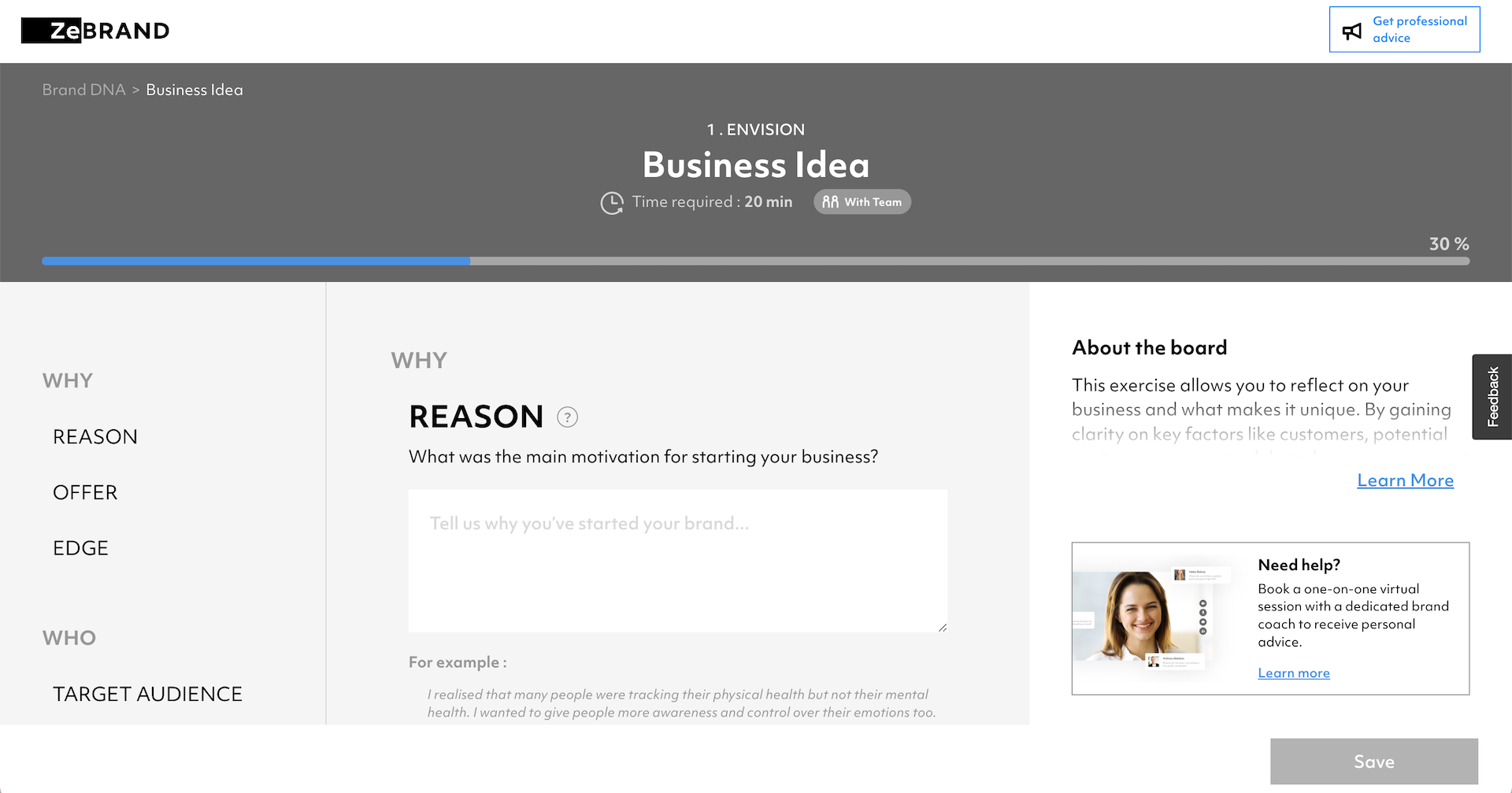
At any point in the unique selling proposition planning process, and building out the details of your successful brand, you can connect one-on-one with a Brand Coach to get personalized advice.
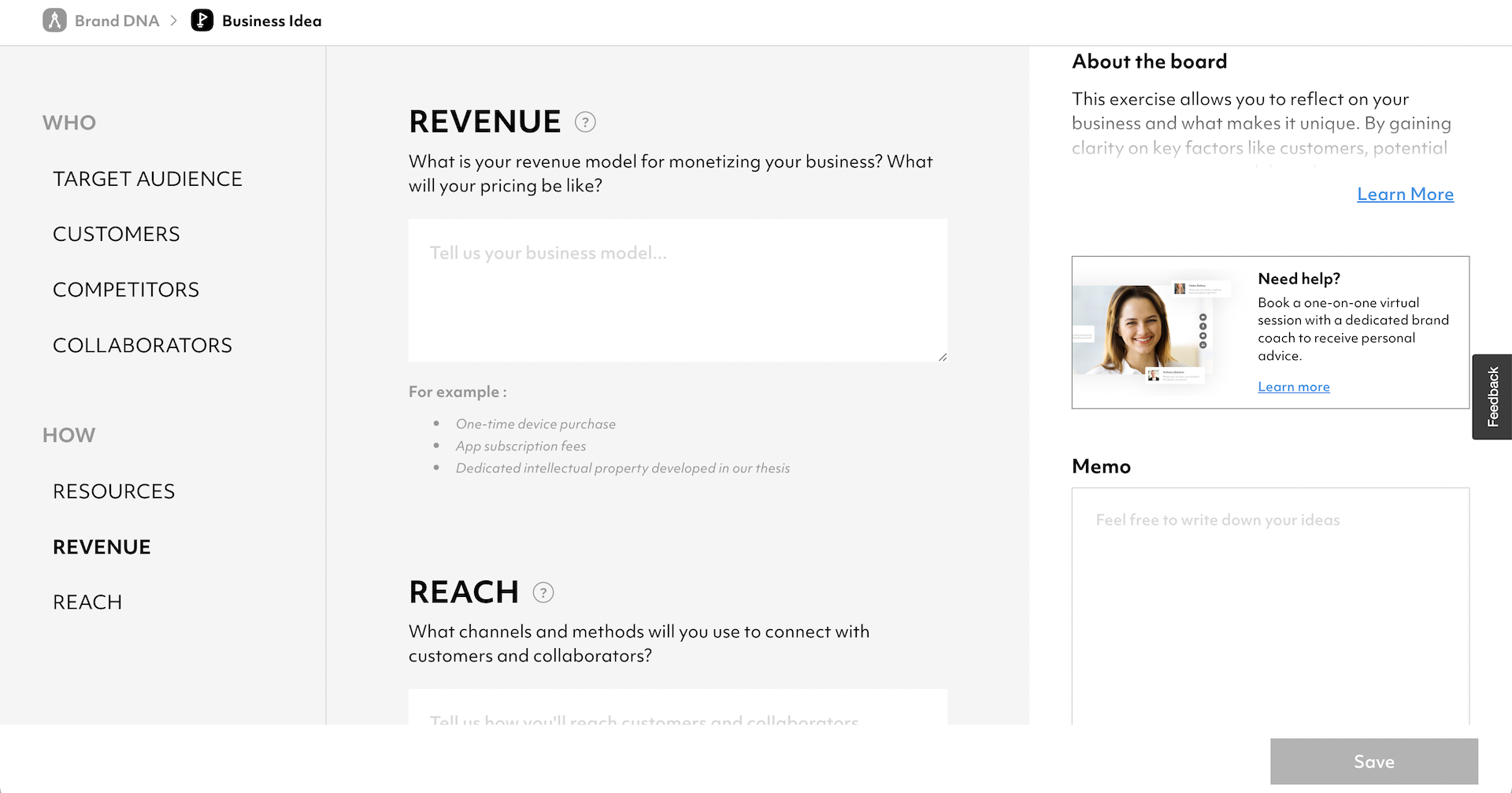
So you've defined your unique selling point... Now what?
Once you've developed your unique selling proposition, tested it with customers, compared it to your competitors, and shown it to your peers (and maybe even your ZeBrand Brand Coach!), it's time to get your message out.
There are endless ways share your USP with your customers. Here are a few basic strategies to start with:
- Your website: Add your new USP to every landing page and core page on your website. This is especially important for ecommerce brands and companies with an online store! Your site is the first point of contact many customers encounter, and a great way to address their biggest pain point from the moment they encounter your business.
- Advertising: Whether you're running YouTube ads, podcast sponsorships, Google AdWords, or anything in between, make sure your USP is clearly communicated everywhere your business shows up.
- Social media: Add your USP to every social media channel you run, plus your social ads. Including your unique selling proposition in the description of your social profiles is an excellent example of how to get your differentiator in front of a large audience.
To be truly successful, businesses must communicate their unique selling propositions consistently across every piece of brand collateral they have. Your USP is only valuable if your customers remember it! And the more times you repeat this essential point, the more likely it is to stick.
The right unique selling proposition can give your company a real competitive advantage
A unique selling proposition isn't just a nice thing to have— it's a necessity for companies that want to stand out in their crowded market. It's different from a UVP, which highlights the overall value of your business, because it goes deep— showing why your competitors can't match or beat what you offer.
Creating your own USP doesn't have to be a complicated process. By identifying your audience, conducting a detailed competitive analysis, identifying your brand's key benefits, testing and refining your message, and encorporating your USP into your marketing strategy, your company can create valuable connections with your customers.
In summary, having a clear and memorable USP can help differentiate your brand from competitors and set you on the path to success. So the sooner you start developing your own USP, the sooner you can enjoy greater brand recognition and long-term loyalty.
Need help developing your own compelling USP? Work with ZeBrand!
If you're unsure of where to start, the expert Brand Coach team at ZeBrand can help. Start building your own brand guidelines here, or Contact Us to learn how to connect with your own Brand Coach.
